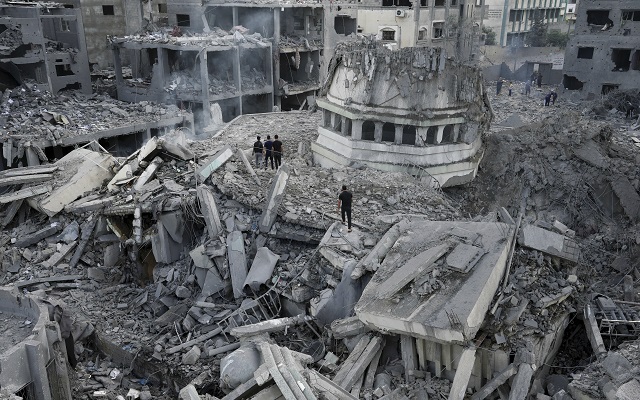
The choice isn’t between Hamas and Israeli hardliners because these are two sides of the same coin
COMMENT | SLAVOJ ZIZEK | The barbarism that Hamas has unleashed on Israel should be condemned unconditionally, with no “ifs” or “buts.” The massacres, rapes, and abductions of civilians from villages, kibbutzim, and a music festival was a pogrom, confirming that Hamas’s true goal is to destroy the state of Israel and all Israelis. That said, the situation demands historical context – not as any kind of justification, but for the sake of clarity about the way forward.
A first consideration is the absolute despair that characterises the lives of most Palestinians. Recall the spate of isolated suicidal attacks on the streets of Jerusalem around a decade ago. An ordinary Palestinian would approach a Jew, pull out a knife, and stab the victim, knowing full well that he or she would be immediately killed. There was no message in these “terrorist” acts, no shouts of “Free Palestine!” Nor was there any larger organisation behind them. They were just individual acts of violent despair.
Things took a turn for the worse when Binyamin Netanyahu formed a new government by allying with far-right, pro-settler parties that openly advocate annexation of Palestinian territories in the West Bank. The new minister of national security, Itamar Ben-Gvir, believes that, “My right, my wife’s right, my kids’ right to move around freely (in the West Bank) is more important than that of the Arabs.” This is a man who was previously barred from army service, owing to his affiliations with extremist anti-Arab parties that had been designated as terrorist organisations following the 1994 massacre of Arabs in Hebron.
After long boasting of its status as the only democracy in the Middle East, Israel under Netanyahu’s current government is morphing into a theocratic state. The current government’s list of “basic principles” states that: “The Jewish people have an exclusive and inalienable right to all parts of the Land of Israel. The government will promote and develop the settlement of all parts of the Land of Israel – in the Galilee, the Negev, the Golan and Judea and Samaria.”
In the face of such commitments, it is absurd to reproach Palestinians for refusing to negotiate with Israel. The current government’s own official program takes negotiations off the table.
Some conspiracy theorists will insist that the Netanyahu government must have known some kind of attack was coming, given the strength of Israel’s surveillance and intelligence-gathering capabilities in Gaza. But while the attack certainly serves the interests of the Israeli hardliners now in power, it also casts doubt on Netanyahu’s claim to be “Mr. Security.”
In any case, it is not hard to see that both sides – Hamas and Israel’s ultra-nationalist government – are against any peace option. Each is committed to a struggle to the death.
The Hamas attack comes at a time of great conflict within Israel, owing to the Netanyahu government’s efforts to gut the judiciary. The country is thus split between nationalist fundamentalists who want to abolish democratic institutions and a civil-society movement that is aware of this threat but reluctant to ally with more moderate Palestinians.
Now, the looming constitutional crisis has been put on hold, and a government of national unity has been announced. It is an old story: deep and apparently existential internal divisions are suddenly overcome, thanks to a common external enemy.
Must there be an external foe to achieve peace and unity at home? How does one break this vicious cycle?
The way forward, notes former Israeli Prime Minister Ehud Olmert, is to fight Hamas while also reaching out to Palestinians who are not anti-Semites and are ready to negotiate. Contrary to what Israeli ultra-nationalists claim, these people do exist. On September 10, more than a hundred Palestinian academics and intellectuals signed an open letter “adamantly reject (ing) any attempt to diminish, misrepresent, or justify antisemitism, Nazi crimes against humanity, or historical revisionism vis-a-vis the Holocaust.”
Once we recognise that not all Israelis are fanatical nationalists, and that not all Palestinians are fanatical anti-Semites, we can start to acknowledge the despair and confusion that give rise to outbursts of evil. We can start to see the strange similarity between the Palestinians, whose homeland is denied to them, and the Jews, whose history is marked by the same experience.
A similar homology applies to the term “terrorism.” During the period of Jewish struggle against the British military in Palestine, “terrorist” had a positive connotation. In the late 1940s, American newspapers ran an advertisement with the headline, “Letter to the Terrorists of Palestine,” wherein the Hollywood screenwriter Ben Hecht wrote, “My Brave Friends. You may not believe what I write you, for there is a lot of fertilizer in the air at the moment. The Jews of America are for you.”
Beneath all the polemics today about who counts as a terrorist, there is the mass of Palestinian Arabs who have been living in a state of limbo for decades. Who are they, and which land is theirs? Are they inhabitants of “Occupied territory,” the “West Bank,” “Judea and Samaria,” or … the State of Palestine which is recognised by 139 countries and has been a United Nations non-member observer state since 2012? Yet Israel, which controls the actual territory, treats Palestinians as temporary settlers, as an obstacle to the establishment of a “normal” state with Jews as the only true natives. Palestinians are treated strictly as a problem. The State of Israel never reached out its hand to them, offering some hope or positively outlining their role in the state they live in.
Hamas and Israeli hardliners are two sides of the same coin. The choice is not one hardline faction or the other; it is between fundamentalists and all those who still believe in the possibility of peaceful co-existence. There can be no compromise between Palestinian and Israeli extremists, who must be combatted with a full-throated defense of Palestinian rights that goes hand-in-hand with an unwavering commitment to the fight against anti-Semitism.
Utopian as this may sound, the two struggles are of a piece. We can and should unconditionally support Israel’s right to defend itself against terrorist attacks. But we also must unconditionally sympathize with the truly desperate and hopeless conditions faced by Palestinians in Gaza and the occupied territories. Those who think there is a “contradiction” in this position are the ones who are effectively blocking a solution.
******

Slavoj Žižek, Professor of Philosophy at the European Graduate School, is International Director of the Birkbeck Institute for the Humanities at the University of London and the author, most recently, of `Heaven in Disorder’ (OR Books, 2021).
Copyright: Project Syndicate, 2023.
 The Independent Uganda: You get the Truth we Pay the Price
The Independent Uganda: You get the Truth we Pay the Price


